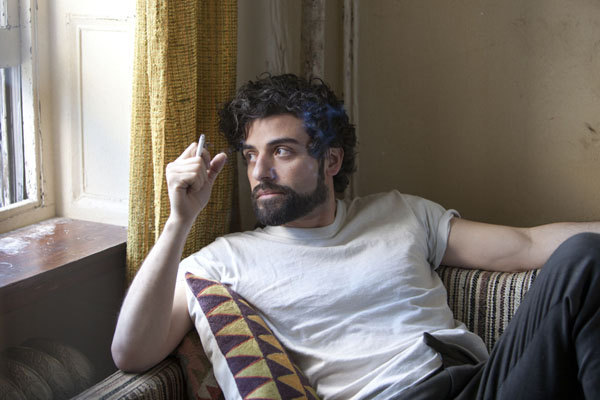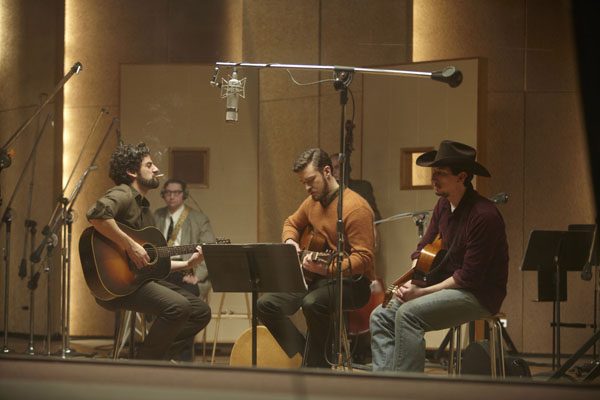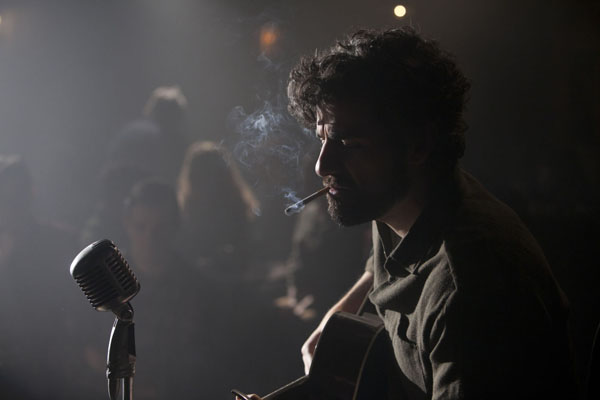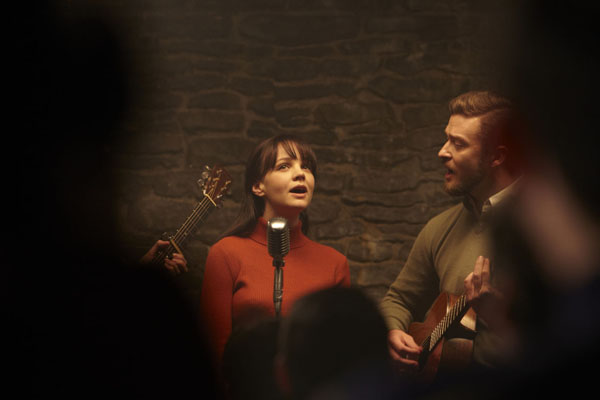“Bob Dylan’s ‘Positively 4th Street’ easily could have been about the parasitic, untrustworthy, unreliable, moderately talented screw-up at the heart of the Coen brothers’ enthralling Inside Llewyn Davis,” begins Todd McCarthy in the Hollywood Reporter. “Set in, but not comprehensively about, the Greenwich Village folk music scene circa 1961, this is a gorgeously made character study leavened with surrealistic dimensions both comic and dark, an unsparing look at a young man who, unlike some of his contemporaries, can’t transcend his abundant character flaws and remake himself as someone else.”
Variety‘s Scott Foundas: “As they did with the 1940s Hollywood setting of Barton Fink, the Coens have again taken a real time and place and freely made it their own, drawing on actual persons and events for inspiration, but binding themselves only to their own bountiful imaginations. The result is a movie that neatly avoids the problems endemic to most period movies—and biopics in particular—in favor of a playful, evocatively subjective reality. Perhaps most surprising to some viewers will be the pic’s surfeit of something the Coens have sometimes been accused of lacking: deep, heartfelt sincerity.”
“Light on plot, heavy on melody and feeling, Inside Llewyn Davis takes some inspiration from the career of folk singer Dave Van Ronk,” writes Indiewire‘s Eric Kohn, adding that “the nomadic Llewyn’s fleeting misadventures, which find him drifting from one couch to the next while struggling to justify his career, contains a delicate, restrained portrait that results in a different kind of movie than anything else the sibling have produced. Littered with catchy tunes composed by T. Bone Burnett, Llewyn Davis is the musical opposite of their bluegrass-heavy O Brother, Where Art Thou, a hyper-stylized take on American iconography that by comparison seems to take place in an alternate reality.”
As Kevin Jagernauth puts it, Llewyn “bounces from place to place, and what he lacks in close friends, he makes up for in a ramshackle group of acquaintances including: the perpetually sour, ex-lover Jean (Carey Mulligan) and her husband Jim (Justin Timberlake), who have their own music group; the well-to-do Upper West Side couple the Gorfeins; Gaslight Café manager Nunzio (Ricardo Codero) and his sister (who can barely tolerate him).” Jagernauth’s Playlist grade, A, seems in good part earned by the Coens’ casting. He notes that “even smaller parts for John Goodman, Garrett Hedlund (nearly dialogue free), Adam Driver (who was part of one of the biggest laughs at the Cannes screening) and Alex Karpovsky, aren’t just cast for cameo purposes, but really enliven what would otherwise be throwaway roles, creating a rich world for this movie.” And a few weeks ago, he reported that Inside Llewyn Davis sees a limited release on December 6 before opening wide on December 20.
We should note that Adam Driver’s duet with Justin Timberlake has sent Vulture‘s Kyle Buchanan pretty much over the moon. Meantime, at Criticwire, Matt Singer has collected the first round of tweeted reactions, and most of them read like big, beaming smiles.
Updates, 5/19: “There comes a time with any artist, when failure has become too painful and losses have to be cut,” writes the Guardian‘s Peter Bradshaw. “Has that time come for Llewyn Davis? He is played with cool, shrewd, watchful restraint by Oscar Isaac, with longish black hair and an unkempt beard, looking for all the world like a young Martin Scorsese. The name ‘Llewyn’ with its Welsh associations, of course deftly brings the word ‘Dylan’ into our minds, although the question whether Llewyn is supposed to be a specific fictional variant of the great troubadour is resolved in the final moments. It could also, at a second subconscious remove, suggest the doomed figure of Dylan Thomas, who succumbed to celebrity and hard liquor in the United States…. The film has some classic Coen tropes: wide establishing shots of eerily empty spaces and interiors with receding perspective lines, deadpan faces, querulously bespectacled old ladies and the mandatory old guy in a semi-darkened office. But the authorial signature is not quite so emphatic as of old, and the Coens treat themselves to a lot of straightforwardly funny lines…. What an intense pleasure this film is, one of the Coens’ best, and the best so far at Cannes.”
“Perhaps middle-aged melancholy has finally caught up with the dark indie princes, spurred on by the colossal box office for 2010’s True Grit, their most sentimental, studio-flavored release to date,” suggests Guy Lodge at In Contention. “Or perhaps the heart-on-sleeve integrity of pre-hippy 1960s folk music simply rubbed off in the research. None of which is to say Inside Llewyn Davis is a soft or overly forgiving film: rather, it’s as generously dimensional an individual character study as anything in their canon.”
“[T]here are the Coen brothers films in which the perversity stays, for the most part, just below the surface (Blood Simple, Fargo, A Serious Man), which tend to be the Coen brothers movies that I love best,” writes EW‘s Owen Gleiberman. “And there are the ones in which perversity stands up and pokes you in the eye (Barton Fink, The Hudsucker Proxy, O Brother, Where Art Thou?), which I, for one, have always found tiresome.” Inside Llewyn Davis is “right smack dab in the middle in a way that I found far from tiresome—the picture is lovingly crafted, eminently watchable, at times even inspired—yet ultimately frustrating. Inside Llewyn Davis comes just close enough to being an authentic, deep-dish portrait of a vital moment in pop-culture history that I felt a bit of an eye poke when it also turned out to be one of the Coens’ masochistic/misanthropic tall tales.”
“From a technical standpoint, Inside Llewyn Davis is glorious,” writes Tim Grierson for Screen, “starting with cinematographer Bruno Delbonnel’s de-saturated period look and production designer Jess Gonchor’s loving re-creation of 1960s New York. This isn’t a nostalgic New York, though: The Coens’ sharp dialogue and clear-eyed observations about Llewyn’s creative struggles keep the proceedings from being too cozy. As for the musical performances, they’re quite strong, with Isaac convincingly delivering his own vocals. Llewyn may never become a star, but this breakthrough role may make Isaac one.”
“The Coens have given us a melancholic, sometimes cruel, often hilarious counterfactual version of music history,” writes Time Out‘s Dave Calhoun. “It’s a what-if imagining of a cultural also-ran that maybe tells us more about the truth than the facts themselves ever could.”
“It’s a film that’s equally rich in pathos and crackling smart-ass humor, as well as a feelingly accurate portrait of a time and place, right down to the nubby Fifties couches and the Haeger lamps.” At RogerEbert.com, Barbara Scharres lays out more of the plot than you might want to know about right now, but if you’re looking for a beginning-to-end outline, she does it well, of course.
The Telegraph‘s Robbie Collin: “This is instant A-list Coens; enigmatic, exhilarating, irresistible.”
“As usual,” writes Time Out New York‘s Keith Uhlich, “the Coens tend toward broad caricature be it John Goodman’s Falstaffian hophead, holding court in the back of a Windy City-bound vehicle driven by a Kerouac-like chauffeur (Garrett Hedlund), or Carey Mulligan’s glumly incensed Jean, who never fails to tear into Davis with obscenity-peppered vitriol. Davis himself isn’t even much of a presence (Isaac hits just the right note of sleepy desperation throughout), which is part of the point. He’s a ghost in his own life, and though he’s loathe to admit it, there’s something about all the hand-to-mouth, day-to-day uncertainty on which he thrives…. But here’s the revelation, the reason why, despite the film’s forlorn tenor, it leaves you grinning ear-to-ear: It’s fun being stuck in a rut.”
Updates, 5/20: “It’s the kind of great work that cuts right through the noise, frivolity and cross-branding that at any given moment threaten to overshadow Cannes,” writes Manohla Dargis in the New York Times.
“For the first half hour or so,” Llewyn “fires on all cylinders, achieving the ideal balance between goofy comedy and a growing sense of genuine despair,” finds Mike D’Angelo, writing at the AV Club. But the trip to Chicago “feels like a desperation move to combat writer’s block.” Then again: “I think The Big Lebowski falls apart in its second half as well, in a similarly lazy way.”
“Oscar Isaac, a Guatemalan-born, Florida-raised 33-year-old actor who’s been working his way toward stardom bit by bit with roles in Robin Hood, Sucker Punch, Drive, and W.E., finally gets his leading role here and makes the most of it,” writes Salon‘s Andrew O’Hehir. It’s a “heartbreaking performance, which gives even the smallest moment palpable weight,” agrees Glenn Heath Jr. at Press Play. “He even manages to convey an entire generation’s frustration and malaise in a single spoken farewell without the hint of indulgence.” And Tom Christie at Thompson on Hollywood notes that Isaac “shows remarkable singing skills (‘we were screwed until we found him,’ said Ethan Coen about the casting), particularly in a scene in which he auditions for the Chicago mogul Bud Grossman (a sharp F. Murray Abraham).”
Time‘s Richard Corliss, who finds the film “ornery, dramatically confounding, lovingly scored,” pretty much knows for whom every character’s a stand-in. He knows his early ’60’s folk scene and vastly prefers the soundtrack to the movie.
“It all feels a little effortless, like the Coens’ on great form is still the Coens at half cock,” writes David Jenkins at Little White Lies. Still, “this is a film that has more great moments, more great characters and—rare for the Coens—more heart and soul than fifty equivalent American comedy-dramas hastily fused together.”
For Geoffrey Macnab, writing in the Independent, Inside Llewyn Davis is “as mercurial as its own lead character, who can seem like a self-pitying, aggressive bore one moment and sing like an angel the next.”
At the House Next Door, Jordan Cronk suggests that “this may be the Coens’ funniest film since The Big Lebowski, a film which trafficked in yet another, completely different type of humor, speaking again to the brothers’ broad writing talents. Befitting it’s title character, Inside Llewyn Davis is a modest, unassuming film, but one with enough latent charm and unique personality to standout even amidst a career of such wild diversions.”
“It’s a character piece, and one of the best, and most understated, movies I’ve ever seen about the grieving process,” writes Jordan Hoffman at Film.com.
“What people are writing off as minor is actually a moment in which their technical precision achieves a complete emotional corollary,” argues Wesley Morris at Grantland. “The film is small in precisely the way that statements like No Country for Old Men were philosophically vast…. This, in fact, is one of the very few of the Coens’ films in which a character’s misfortunes are not the fault of God, the Devil, the universes, or some unexplained, unforgiving nihilistic force. They’re Llewyn’s. For these two filmmakers to stop looking up, down, and all around for blame and to try looking inward is the opposite of minor.”
Updates, 5/21: “The shrewdly calculating Coen brothers (whose spiritual third sibling surely must be Michael Haneke) strike again,” writes Adam Cook in the Notebook, with “another cynical portrayal of a world populated with hateful caricatures put there just to make the protagonist’s life a living hell…. Lit with a nostalgic glow and shot with a subtle rigor, it’s one of their ‘nicest’ looking films, and as usual, is paced nearly to perfection (it can’t be denied that the brothers know how to assemble a film), but it’s hard to be too celebratory of a result so obvious: that a Coen Bros. tribute to something they love would express itself so hatefully.”
“During a career of making films that are neither full-fledged satires nor sentimental exercises in nostalgia, Joel and Ethan Coen have perfected a genre that might be termed smartass nostalgia,” suggests Richard Porto at the Daily Beast. That said, “the Coens are probably the only American filmmakers with the chutzpah to name check the American Trotskyist Max Shachtman in a commercial movie. During a juncture when the Old Left hadn’t quite coalesced into the New Left, the Coens also slyly allude to the career of Moe Asch, a lefty who ran Folkways Records but was quite stingy in doling out cash to the artists he signed, via the character of Mel Novikoff (Jerry Grayson).”
“Both soulful and astringent in its depiction of the creative life, Inside Llewyn Davis is a lovely, deeply resonant film by filmmakers at the top of their game,” writes Filmmaker‘s Scott Macaulay.
Update, 5/22: “Intentionally or otherwise,” writes the Voice‘s Stephanie Zacharek, “the Coens might be channeling the Hal Ashby of The Landlord, or Next Stop, Greenwich Village-era Paul Mazursky. Whatever they’re doing, it’s remarkable—cockeyed humanism at its best.”
Update, 5/24: Catherine Shoard talks with Oscar Isaac for the Guardian.
Update, 5/26: Inside Llewyn Davis has won the Grand Prix, basically placing second.
Cannes 2013 Index. And you can watch over 100 films that have seen their premieres in Cannes right here on Fandor. For news and tips throughout the day every day, follow @KeyframeDaily on Twitter and/or the RSS feed. Get Keyframe Daily in your inbox by signing in at fandor.com/daily.







